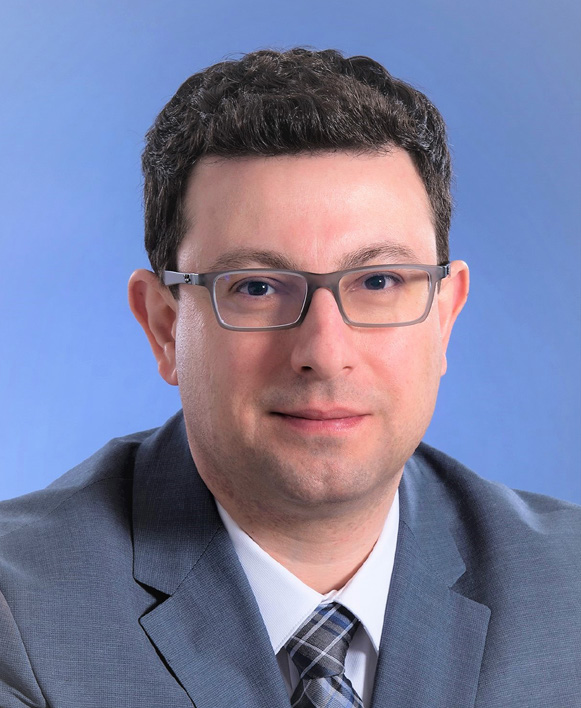Fall 2021 (Volume 31, Number 3)
The CRA's 2021 Emerging Investigator:
Dr. Zahi Touma
Download PDF

Your research focuses on patients with
systemic lupus erythematosus (SLE) and
measurement science with a particular
interest in the assessment of disease
activity, patient-reported outcomes
and cognitive function. One of your
most significant contributions has
been development of the SLE disease
activity indices — the SLEDAI Responder
Index-50 (S2KRI-50) and SLEDAI-2K
Glucocorticoids Index (SLEDAI-2KG). Can
you tell us more about your work and the
development of these SLE disease activity
indices?
My work encompasses clinical, research,
teaching and other administrative tasks. Developing a
new instrument is always exciting. The first step is to have
an understanding of why you need a new instrument and
what needs to be measured and in whom, in addition to
its benefit to rheumatology.
Each of these instruments brings a new concept in the
way you assess disease activity where S2KRI-50 is focused
on measuring ≥50% improvement in disease activity over
time, while SLEDAI-2KG measures disease activity while
accounting for prednisone dosage.
Another major focus of your research is the assessment
of cognitive impairment in patients with SLE. You’ve
established the NeuroLupus Program with the goal of
developing improved methods of identifying cognitive
impairment in SLE and understanding its course over time
and impact on health-related quality of life and productivity.
Why was creating this program so important and what have
you learned so far?
There is an unmet need to improve and standardize the
way we measure and define cognitive impairment in SLE in
ambulatory settings. Cognitive impairment is highly prevalent
among patients with SLE, and we have shown this
in our recent systematic review of the literature. More recently,
we also highlighted the lack of agreement between
studies on tests used to measure cognitive impairment
and the way it is defined. The current available measures
of cognitive impairment are associated with time and cost
burden and our work provides evidence on the validity of
new instruments that can facilitate the assessment of cognitive
function. Our future projects are focused on identifying
different cognitive phenotypes in
SLE, studying the role of functional MRI
brain images in cognitive assessment
and the role of biomarkers.
Having published 117 peer-reviewed
manuscripts and several book chapters,
you recently also edited the Outcome
Measures and Metrics in SLE book, which
was published in August 2021. What has
your experience as editor of this book
been like?
This was a very demanding and lengthy
process but very rewarding. It takes
a huge amount of work to develop the
main theme of the book, the chapters, inviting authors,
editing, proofing and finally publishing the material.
Are there other areas of interest you would like to
investigate in the future? What projects will you be
undertaking this year?
Currently, I am focused on a major project related to the
OMERACT SLE working group. We have developed a large
international group of lupologists, scientists, patients,
and other stakeholders, to revisit the domains and instruments
used in the assessment of SLE.
What are some of the highlights and challenges you
have experienced thus far in your career? How have you
overcome these challenges?
The life of a scientist is full of challenges and achievements,
and you have to be dedicated to the science. Ultimately,
the goal of improving patients’ quality of life is the
reward. Only perseverance, hard work, and time will help
you achieve your goals.
What has been your proudest accomplishment to date in
your research?
Everything plays an equal part in all of my achievements,
and currently my biggest joy would be guiding my students
and watching them flourish in their careers.
What was your first thought when you learned that you
would receive this award?
I am honoured to have my peers recognize my efforts and
honour me with this prestigious award.
For those wanting to pursue rheumatology and a career in
research, what advice would you give them?
Anyone pursuing rheumatology as a specialty should understand
how rewarding it is to help patients and make a
difference in their lives. For those pursuing research, it is
satisfying to know that you will contribute to knowledge
advancement, and this requires a lot of dedication.
If you weren’t pursuing research as a career, what would you
be doing?
I enjoy clinical work and I would have dedicated all my
time to this.
If you had an extra hour in the day, how would you spend it?
I am very artistic so I would enjoy the time painting.
If you could eat one food for the rest of your life, what would
it be?
I love Italian cuisine and I would enjoy various pasta
dishes and fresh vegetables.
How many cups of coffee does it take to make a productive
day?
One is more than enough.
Zahi Touma, MD, PhD, FACP, FACR
Rheumatologist,
Associate Professor of Medicine, Division of Rheumatology
Faculty of Medicine, University of Toronto
Clinician Scientist, Schroeder Arthritis Institute,
Krembil Research Institute, Toronto, Ontario
|
